Njengamartin399
On this page, you find all documents, package deals, and flashcards offered by seller njengamartin399.
- 141
- 0
- 7
Community
- Followers
- Following
148 items
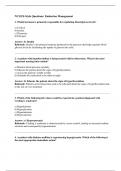
Endocrine Management
1. Which hormone is primarily responsible for regulating blood glucose levels? a) Cortisol b) Insulin c) Thyroxine d) Estrogen Answer: b) Insulin Rationale: Insulin is the primary hormone produced by the pancreas that helps regulate blood glucose levels by facilitating the uptake of glucose into cells. ________________________________________ 2. A patient with hypothyroidism is being treated with levothyroxine. What is the most important nursing intervention? a) Monitor blood pressure r...
- Package deal
- Exam (elaborations)
- • 18 pages •
1. Which hormone is primarily responsible for regulating blood glucose levels? a) Cortisol b) Insulin c) Thyroxine d) Estrogen Answer: b) Insulin Rationale: Insulin is the primary hormone produced by the pancreas that helps regulate blood glucose levels by facilitating the uptake of glucose into cells. ________________________________________ 2. A patient with hypothyroidism is being treated with levothyroxine. What is the most important nursing intervention? a) Monitor blood pressure r...
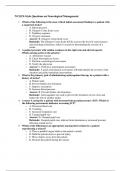
Neurological Management
1. Which of the following is the most critical initial assessment finding in a patient with a suspected stroke? o A. Blood pressure o B. Glasgow Coma Scale score o C. Pupillary response o D. Oxygen saturation o Answer: B. Glasgow Coma Scale score Rationale: The Glasgow Coma Scale (GCS) assesses the level of consciousness and neurological function, which is crucial for determining the severity of a stroke. 2. A patient presents with sudden weakness in the right arm and slurred speech. Whic...
- Package deal
- Exam (elaborations)
- • 12 pages •
1. Which of the following is the most critical initial assessment finding in a patient with a suspected stroke? o A. Blood pressure o B. Glasgow Coma Scale score o C. Pupillary response o D. Oxygen saturation o Answer: B. Glasgow Coma Scale score Rationale: The Glasgow Coma Scale (GCS) assesses the level of consciousness and neurological function, which is crucial for determining the severity of a stroke. 2. A patient presents with sudden weakness in the right arm and slurred speech. Whic...
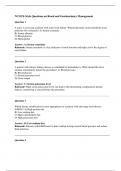
Renal and Genitourinary Management
Question 1 A nurse is assessing a patient with acute renal failure. Which laboratory result should the nurse prioritize for evaluation? A) Serum creatinine B) Serum albumin C) Blood glucose D) Hemoglobin Answer: A) Serum creatinine Rationale: Serum creatinine is a key indicator of renal function and helps assess the degree of renal failure. ________________________________________ Question 2 A patient with chronic kidney disease is scheduled for hemodialysis. What should the nurse monit...
- Package deal
- Exam (elaborations)
- • 19 pages •
Question 1 A nurse is assessing a patient with acute renal failure. Which laboratory result should the nurse prioritize for evaluation? A) Serum creatinine B) Serum albumin C) Blood glucose D) Hemoglobin Answer: A) Serum creatinine Rationale: Serum creatinine is a key indicator of renal function and helps assess the degree of renal failure. ________________________________________ Question 2 A patient with chronic kidney disease is scheduled for hemodialysis. What should the nurse monit...
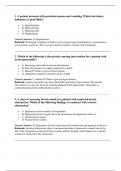
Gastrointestinal Management
1. A patient presents with persistent nausea and vomiting. Which electrolyte imbalance is most likely? • A. Hyperkalemia • B. Hypocalcemia • C. Hyponatremia • D. Hypokalemia Correct Answer: D. Hypokalemia Rationale: Prolonged vomiting can lead to a loss of potassium (hypokalemia), as potassium is lost in gastric secretions. This can cause muscle weakness, fatigue, and arrhythmias. ________________________________________ 2. Which of the following is the priority nursing intervent...
- Package deal
- Exam (elaborations)
- • 20 pages •
1. A patient presents with persistent nausea and vomiting. Which electrolyte imbalance is most likely? • A. Hyperkalemia • B. Hypocalcemia • C. Hyponatremia • D. Hypokalemia Correct Answer: D. Hypokalemia Rationale: Prolonged vomiting can lead to a loss of potassium (hypokalemia), as potassium is lost in gastric secretions. This can cause muscle weakness, fatigue, and arrhythmias. ________________________________________ 2. Which of the following is the priority nursing intervent...
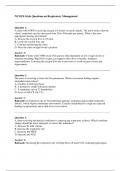
Respiratory Management
Question 1: A client with COPD is receiving oxygen at 6 L/min via nasal cannula. The nurse notices that the client's respiratory rate has decreased from 20 to 10 breaths per minute. What is the most appropriate nursing intervention? A. Increase the oxygen flow to 8 L/min B. Lower the oxygen flow rate C. Continue monitoring the client D. Place the client in high Fowler's position Answer: B Rationale: Clients with COPD retain CO2 and are often dependent on low oxygen levels to stimula...
- Package deal
- Exam (elaborations)
- • 21 pages •
Question 1: A client with COPD is receiving oxygen at 6 L/min via nasal cannula. The nurse notices that the client's respiratory rate has decreased from 20 to 10 breaths per minute. What is the most appropriate nursing intervention? A. Increase the oxygen flow to 8 L/min B. Lower the oxygen flow rate C. Continue monitoring the client D. Place the client in high Fowler's position Answer: B Rationale: Clients with COPD retain CO2 and are often dependent on low oxygen levels to stimula...
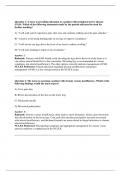
Pripheral Vascular Management
Question 1: A nurse is providing education to a patient with peripheral artery disease (PAD). Which of the following statements made by the patient indicates the need for further teaching? A) “I will walk until I experience pain, then rest, and continue walking once the pain subsides.” B) “I need to avoid using heating pads on my legs to improve circulation.” C) “I will elevate my legs above the level of my heart to reduce swelling.” D) “I will stop smoking to improve my circul...
- Package deal
- Exam (elaborations)
- • 28 pages •
Question 1: A nurse is providing education to a patient with peripheral artery disease (PAD). Which of the following statements made by the patient indicates the need for further teaching? A) “I will walk until I experience pain, then rest, and continue walking once the pain subsides.” B) “I need to avoid using heating pads on my legs to improve circulation.” C) “I will elevate my legs above the level of my heart to reduce swelling.” D) “I will stop smoking to improve my circul...
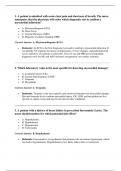
Cardiovascular Management
1. A patient is admitted with acute chest pain and shortness of breath. The nurse anticipates that the physician will order which diagnostic test to confirm a myocardial infarction? • A. Electrocardiogram (ECG) • B. Chest X-ray • C. Arterial blood gas (ABG) • D. Magnetic resonance imaging (MRI) Correct Answer: A. Electrocardiogram (ECG) • Rationale: An ECG is the first diagnostic test used to confirm a myocardial infarction. It can identify ST-segment elevations or depressions, T...
- Package deal
- Exam (elaborations)
- • 22 pages •
1. A patient is admitted with acute chest pain and shortness of breath. The nurse anticipates that the physician will order which diagnostic test to confirm a myocardial infarction? • A. Electrocardiogram (ECG) • B. Chest X-ray • C. Arterial blood gas (ABG) • D. Magnetic resonance imaging (MRI) Correct Answer: A. Electrocardiogram (ECG) • Rationale: An ECG is the first diagnostic test used to confirm a myocardial infarction. It can identify ST-segment elevations or depressions, T...
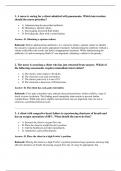
Introduction to Prioritization & Clinical Judgment for NCLEX-RN®
1. A nurse is caring for a client admitted with pneumonia. Which intervention should the nurse prioritize? • A. Administering the prescribed antibiotic • B. Obtaining a sputum culture • C. Encouraging increased fluid intake • D. Providing the client with a warm blanket Answer: B. Obtaining a sputum culture Rationale: Before administering antibiotics, it is crucial to obtain a sputum culture to identify the causative organism and ensure appropriate treatment. Administering the antib...
- Package deal
- Exam (elaborations)
- • 22 pages •
1. A nurse is caring for a client admitted with pneumonia. Which intervention should the nurse prioritize? • A. Administering the prescribed antibiotic • B. Obtaining a sputum culture • C. Encouraging increased fluid intake • D. Providing the client with a warm blanket Answer: B. Obtaining a sputum culture Rationale: Before administering antibiotics, it is crucial to obtain a sputum culture to identify the causative organism and ensure appropriate treatment. Administering the antib...
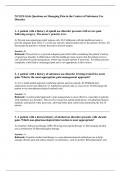
Managing Pain in the Context of Substance Use Disorder
1. A patient with a history of opioid use disorder presents with severe pain following surgery. The nurse’s priority is to: A) Provide non-opioid pain relief options only. B) Collaborate with the healthcare team to provide adequate pain relief. C) Avoid any narcotic administration due to the patient's history. D) Encourage the patient to tolerate the pain to prevent relapse. Answer: B Rationale: The priority is to provide adequate pain relief while considering the patient’s history of ...
- Exam (elaborations)
- • 19 pages •
1. A patient with a history of opioid use disorder presents with severe pain following surgery. The nurse’s priority is to: A) Provide non-opioid pain relief options only. B) Collaborate with the healthcare team to provide adequate pain relief. C) Avoid any narcotic administration due to the patient's history. D) Encourage the patient to tolerate the pain to prevent relapse. Answer: B Rationale: The priority is to provide adequate pain relief while considering the patient’s history of ...
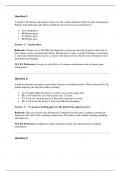
Managing Persistent Pain
A patient with chronic pain reports using over-the-counter ibuprofen daily for pain management. Which of the following side effects should the nurse be most concerned about? • A) Constipation • B) Hypertension • C) Gastric ulcer • D) Weight gain Answer: C - Gastric ulcer Rationale: Chronic use of NSAIDs like ibuprofen can increase the risk of gastric ulcers due to their impact on the gastrointestinal lining. Monitoring for signs of gastric bleeding or ulceration is important. Hyper...
- Exam (elaborations)
- • 28 pages •
A patient with chronic pain reports using over-the-counter ibuprofen daily for pain management. Which of the following side effects should the nurse be most concerned about? • A) Constipation • B) Hypertension • C) Gastric ulcer • D) Weight gain Answer: C - Gastric ulcer Rationale: Chronic use of NSAIDs like ibuprofen can increase the risk of gastric ulcers due to their impact on the gastrointestinal lining. Monitoring for signs of gastric bleeding or ulceration is important. Hyper...
